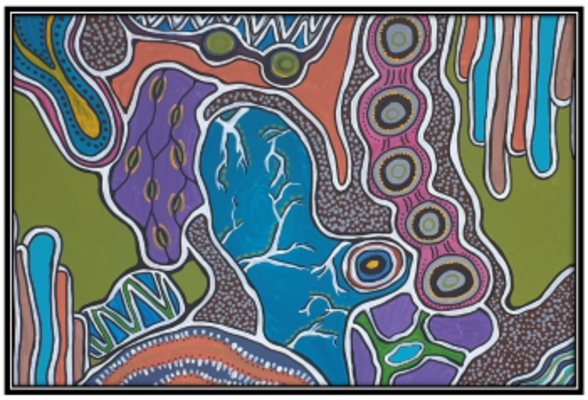Harmony Through Songlines

Original artwork 'Harmony Through Songlines' commissioned from First Nations artist Ailsa Walsh.
The Queensland Mental Health Commission (the Commission) acknowledges the recent outcome of the Voice to Parliament referendum (the referendum).
The Commission views the outcome of the referendum as a setback to reconciliation and makes it more important than ever that we recommit to reconciliation and finding common ground as a unified nation.
We acknowledge the significant mental health and wellbeing impacts the referendum and its campaign has had, particularly on Aboriginal and Torres Strait Islander peoples and communities across Queensland and Australia, but also on non-Indigenous Australians.
At this difficult time, we ask for unity and leadership which nurtures cultural safety for Aboriginal and Torres Strait Islander peoples. Cultural safety is a human right, and we all hold a level of responsibility to ensure that our community is a culturally safe place for our First Nations people.
Beyond the referendum outcome, the Commission expresses continued support for reconciliation and self-determination. We’re determined to elevate the voices and experiences of First Nations people through community consultation and the renewed approaches and initiatives that are implemented by the Commission and our partner organisations.
We support truth telling
Recent discourse about the future of Path to Treaty and the truth telling process in Queensland has caused increased distress for Aboriginal and Torres Strait Islander people.
Guided by the Interim Truth and Treaty Body, the Queensland truth-telling and healing inquiry is an important step towards our Path to Treaty. The inquiry will provide a public platform for First Nations people to tell their truth, and understand how past laws, policies and practices have continued to impact Aboriginal and Torres Strait Islander peoples.
Telling the truth about our past and accepting our shared histories is where healing can begin. This is the most important step on our Path to Treaty.
We support the Path to Treaty
The Commission strongly supports the continuation of the Path to Treaty and the truth-telling processes that are currently underway in Queensland. The outcome of the referendum should not delay or put these important mechanisms, that will contribute to reconciliation and healing, at risk.
Path to Treaty sets the foundations for a shared future in which all Queenslanders are equal in shaping and informing future decisions that impact their lives and communities. It publicly recognises the custodianship of Australia's lands, waters and air as belonging to the Aboriginal and Torres Strait Islander peoples and the history of Australia, long before colonisation.
Historically, there has been little acknowledgement of the negative impacts of colonisation on Aboriginal and Torres Strait Islander peoples and how that has accumulated across generations, including ongoing impacts of intergenerational trauma, racism, and discrimination.
The Commission considers Path to Treaty as a critical component of Queensland’s healing and Reconciliation journey. It will allow the relationship between Aboriginal and Torres Strait Islander peoples and all Queenslanders to recognise the past and move forward as a united nation, with a shared future built on respect and understanding.
Support is available
- 13YARN. For culturally safe First Nations crisis support, you can give 13YARN a call on 13 92 76. They offer a free, confidential one-on-one yarning opportunity with an Aboriginal and/or Torres Strait Islander Crisis Supporter, 24 hours a day, 7 days a week.
- Wellmob. Online social, emotional and cultural resources, developed by and for First Nations people, are available through Wellmob. This includes websites, apps, podcasts, videos, social media, and online counselling with a focus on social and emotional wellbeing. Explore the WellMob resources.
- AIMhi-Y. A mobile app to support the wellbeing of First Nations young people, aged 12-25, called AIMhi-Y. The app is a strengths-based, digital wellbeing tool that integrates education and brief intervention, embedding guidance from Elders, and building connection with culture, Country and language. The AIMhi-Y app is available for download on mobile devices via the App Store (Apple) or Google Play (Android).
- Lifeline. Lifeline offers support to Australians experiencing emotional distress with access to 24 hour crisis support and suicide prevention servies. Call 13 11 14.
- Suicide Call Back Service. The Suicide Call Back Service is a 24-hour national telephone crisis counselling and online service for people aged 18 years and over. Phone 1300 659 467.
